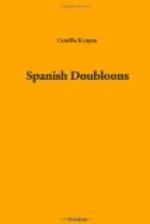I had named the terrier in the first ten minutes of our acquaintance. Crusoe was the designation by which he was presented to his new associates. It was good to see how swiftly the habits of civilization returned to him. Soon he was getting under foot and courting caresses as eagerly as though all his life he had lived on human bounty, instead of bringing down his own game in royal freedom. Yet with all his well-bred geniality there was no wandering of his allegiance. I was his undisputed queen and lady paramount.
Crusoe, then, became a member of the party in good and regular standing—much more so than his mistress. Mr. Tubbs compared him not unfavorably with a remarkable animal of his own, for which the New York Kennel Club had bidden him name his own price, only to be refused with scorn. Violet tolerated him. Aunt Jane called him a dear weenty pettums love. Captain Magnus kicked him when he thought I was not looking, Cuthbert Vane chummed with him in frankest comradeship, and Mr. Shaw softened toward him to an extent which made me mainly murmur Love me, love my dog—only reversed. Not that I in the least wanted to be loved, only you feel it an impertinence in a person who so palpably does not love you to endeavor to engage the affections of your bull-terrier.
As to Cookie, he magnanimously consented to overlook Crusoe’s dubious past as a ghost-pig, and fed him so liberally that the terrier’s lean and graceful form threatened to assume the contours of a beer-keg.
VIII
AN EXCURSION AND AN ALARM
As the only person who had yet discovered anything on the island, I was now invested with a certain importance. Also, I had a playfellow and companion for future walks, in lieu of Cuthbert Vane, held down tight to the thankless toil of treasure-hunting by his stem taskmaster. But at the same time I was provided with an annoying, because unanswerable, question which had lodged at the back of my mind like a crumb in the throat:
By what strange chance had the copra gatherer gone away and left Crusoe on the island?
Since the discovery of Crusoe the former inhabitant of the cabin in the clearing had been much in my thoughts. I had been dissatisfied with him from the beginning, first, because he was not a pirate, and also because he had left behind no relic more fitting than a washtub. Not a locket, not a journal, not his own wasted form stretched upon a pallet—
I had expressed these sentiments to Cuthbert Vane, who replied that in view of the washtub it was certain that the hermit of the island had not been a pirate, as he understood they never washed. I said neither did any orthodox hermit, to which Mr. Vane rejoined that he probably was not orthodox but a Dissenter. He said Dissenters were so apt to be peculiar, don’t you know?




